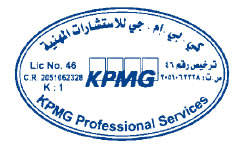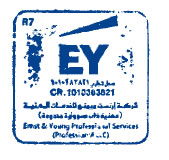Independent auditors’ report on the audit of the consolidated financial statements to the shareholders of Alinma Bank (A Saudi Joint Stock Company)
Report on the audit of the consolidated financial statements
Opinion
We have audited the consolidated financial statements of Alinma Bank and its subsidiaries (collectively referred to as the “Bank”), which comprise the consolidated statement of financial position as at December 31, 2022, and the consolidated statement of income, consolidated statement of comprehensive income, consolidated statement of changes in equity and consolidated statement of cash flows for the year then ended, and notes to the consolidated financial statements, which include significant accounting policies and other explanatory information.
In our opinion, the accompanying consolidated financial statements present fairly, in all material respects, the consolidated financial position of the Bank as at December 31, 2022, and its consolidated financial performance and its consolidated cash flows for the year then ended in accordance with International Financial Reporting Standards (“IFRS”) that are endorsed in the Kingdom of Saudi Arabia and other standards and pronouncements that are endorsed by the Saudi Organization for Chartered and Professional Accountants (“SOCPA”) (collectively referred to as “IFRS that are endorsed in Kingdom of Saudi Arabia”).
Basis for Opinion
We conducted our audit in accordance with International Standards on Auditing that are endorsed in the Kingdom of Saudi Arabia. Our responsibilities under those standards are further described in the Auditors’ Responsibilities for the audit of the consolidated financial statements section of our report. We are independent of the Bank in accordance with the International Code of Ethics for Professional Accountants (including International Independence Standards), that is endorsed in the Kingdom of Saudi Arabia (the “Code”), that is relevant to our audit of the consolidated financial statements, and we have fulfilled our other ethical responsibilities in accordance with this Code. We believe that the audit evidence we have obtained is sufficient and appropriate to provide a basis for our opinion.
Key Audit Matters
Key audit matters are those matters that, in our professional judgment, were of most significance in our audit of the consolidated financial statements of the current period. These matters were addressed in the context of our audit of the consolidated financial statements as a whole, and in forming our opinion thereon, and we do not provide a separate opinion on these matters. For the key audit matter below, a description of how our audit addressed the matter is provided in that context:
| Key audit matter | How our audit addressed the key audit matter |
| Expected credit loss allowance against financing As at December 31, 2022, the gross financing of the Bank was Saudi Riyals (“SAR”) 150,473 million against which an expected credit loss (“ECL”) allowance of SAR 3,981 million was maintained. We considered this as a key audit matter as the determination of ECL involves significant estimation and management judgment and this has a material impact on the consolidated financial statements of the Bank. The key areas of judgment include:
estimate the likelihood of borrowers that may have experienced SICR due to current economic outlook. |
|
December 31, 2022. Refer to the summary of significant accounting policy note 3 (j) for the impairment of financial assets; note 2 (e) (i) which contains the disclosure of critical accounting judgments, estimates and assumptions relating to impairment losses on financial assets and the impairment assessment methodology used by the Bank; note 8 which contains the disclosure of impairment against financing; and note 28.1 for details of credit quality analysis and key assumptions and factors considered in determination of ECL. |
|
|
Other information included in the Bank’s 2022 annual report
The Board of Directors of the Bank (the “Directors”) are responsible for the other information in the Bank’s annual report. Other information consists of the information included in the Bank’s 2022 annual report, other than the consolidated financial statements and our auditors’ report thereon. The annual report is expected to be made available to us after the date of this auditors’ report.
Our opinion on the consolidated financial statements does not cover the other information and we will not express any form of assurance conclusion thereon.
In connection with our audit of the consolidated financial statements, our responsibility is to read the other information identified above when it becomes available and, in doing so, consider whether the other information is materially inconsistent with the consolidated financial statements or our knowledge obtained in the audit, or otherwise appears to be materially misstated.
Responsibilities of Directors and those Charged with Governance for the Consolidated Financial Statements
The Directors are responsible for the preparation and fair presentation of the consolidated financial statements in accordance with the IFRS that are endorsed in Kingdom of Saudi Arabia, the applicable requirements of the Companies Law, the Banking Control Law in the Kingdom of Saudi Arabia and the Bank’s By-Laws, and for such internal control as Directors determine is necessary to enable the preparation of consolidated financial statements that are free from material misstatement, whether due to fraud or error.
In preparing the consolidated financial statements, the Directors are responsible for assessing the Bank’s ability to continue as a going concern, disclosing, as applicable, matters related to going concern and using the going concern basis of accounting unless Directors either intend to liquidate the Bank or to cease operations, or has no realistic alternative but to do so.
Those charged with governance are responsible for overseeing the Bank’s financial reporting process.
Auditors’ responsibilities for the audit of the consolidated financial statements
Our objectives are to obtain reasonable assurance about whether the consolidated financial statements as a whole are free from material misstatement, whether due to fraud or error, and to issue an auditors’ report that includes our opinion. Reasonable assurance is a high level of assurance, but is not a guarantee that an audit conducted in accordance with International Standards on Auditing that are endorsed in the Kingdom of Saudi Arabia will always detect a material misstatement when it exists. Misstatements can arise from fraud or error and are considered material if, individually or in the aggregate, they could reasonably be expected to influence the economic decisions of users taken on the basis of these consolidated financial statements.
As part of an audit in accordance with International Standards on Auditing that are endorsed in the Kingdom of Saudi Arabia, we exercise professional judgment and maintain professional skepticism throughout the audit. We also:
- Identify and assess the risks of material misstatement of the consolidated financial statements, whether due to fraud or error, design and perform audit procedures responsive to those risks, and obtain audit evidence that is sufficient and appropriate to provide a basis for our opinion. The risk of not detecting a material misstatement resulting from fraud is higher than for one resulting from error, as fraud may involve collusion, forgery, intentional omissions, misrepresentations, or the override of internal control.
- Obtain an understanding of the internal controls relevant to the audit in order to design audit procedures that are appropriate in the circumstances, but not for the purpose of expressing an opinion on the effectiveness of the Bank’s internal controls.
- Evaluate the appropriateness of accounting policies used and the reasonableness of accounting estimates and related disclosures made by the Directors.
- Conclude on the appropriateness of the Directors use of the going concern basis of accounting and, based on the audit evidence obtained, whether a material uncertainty exists related to events or conditions that may cast significant doubt on the Bank’s ability to continue as a going concern. If we conclude that a material uncertainty exists, we are required to draw attention in our auditors’ report to the related disclosures in the consolidated financial statements or, if such disclosures are inadequate, to modify our opinion. Our conclusions are based on the audit evidence obtained up to the date of our auditors’ report. However, future events or conditions may cause the Bank to cease to continue as a going concern.
- Evaluate the overall presentation, structure and content of the consolidated financial statements, including the disclosures, and whether the consolidated financial statements represent the underlying transactions and events in a manner that achieves fair presentation.
- Obtain sufficient appropriate audit evidence regarding the financial information of the entities or business activities within the Bank
to express an opinion on the consolidated financial statements.
We are responsible for the direction, supervision and performance of the Bank’s audit. We remain solely responsible for our audit opinion.
We communicate with those charged with governance regarding, among other matters, the planned scope and timing of the audit and significant audit findings, including any significant deficiencies in internal control that we identify during our audit.
We also provide those charged with governance with a statement that we have complied with relevant ethical requirements regarding independence, and to communicate with them all relationships and other matters that may reasonably be thought to bear on our independence, and where applicable, actions taken to eliminate threats or safeguards applied.
From the matters communicated with those charged with governance, we determine those matters that were of most significance in the audit of the consolidated financial statements of the current period and are therefore the key audit matters. We describe these matters in our auditors’ report unless law or regulation precludes public disclosure about the matter or when, in extremely rare circumstances, we determine that a matter should not be communicated in our report because the adverse consequences of doing so would reasonably be expected to outweigh the public interest benefits of such communication.
Report on other legal and regulatory requirements
Based on the information that has been made available to us, nothing has come to our attention that causes us to believe that Bank is not in compliance, in all material respects, with the applicable requirements of the Companies Law, the Banking Control law in the Kingdom of Saudi Arabia and Bank’s By-Laws in so far as they affect the preparation and presentation of the consolidated financial statements.
For KPMG Professional Services

Abdulaziz Abdullah Alnaim
Certified Public Accountant
License number 394
For Ernst & Young Professional Services

Hesham A. Alatiqi
Certified Public Accountant
License number 523


(21 Rajab 1444H)
(12 February 2023)

